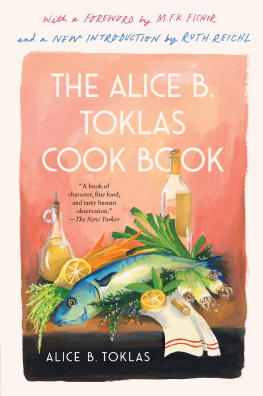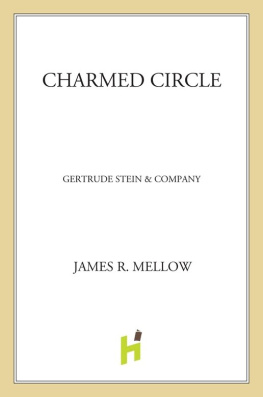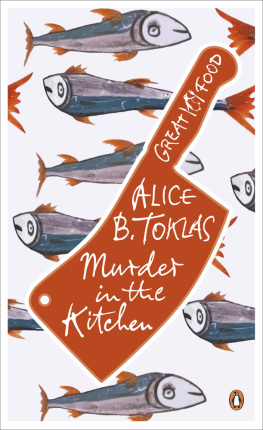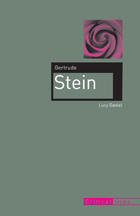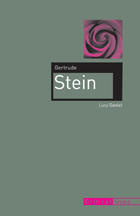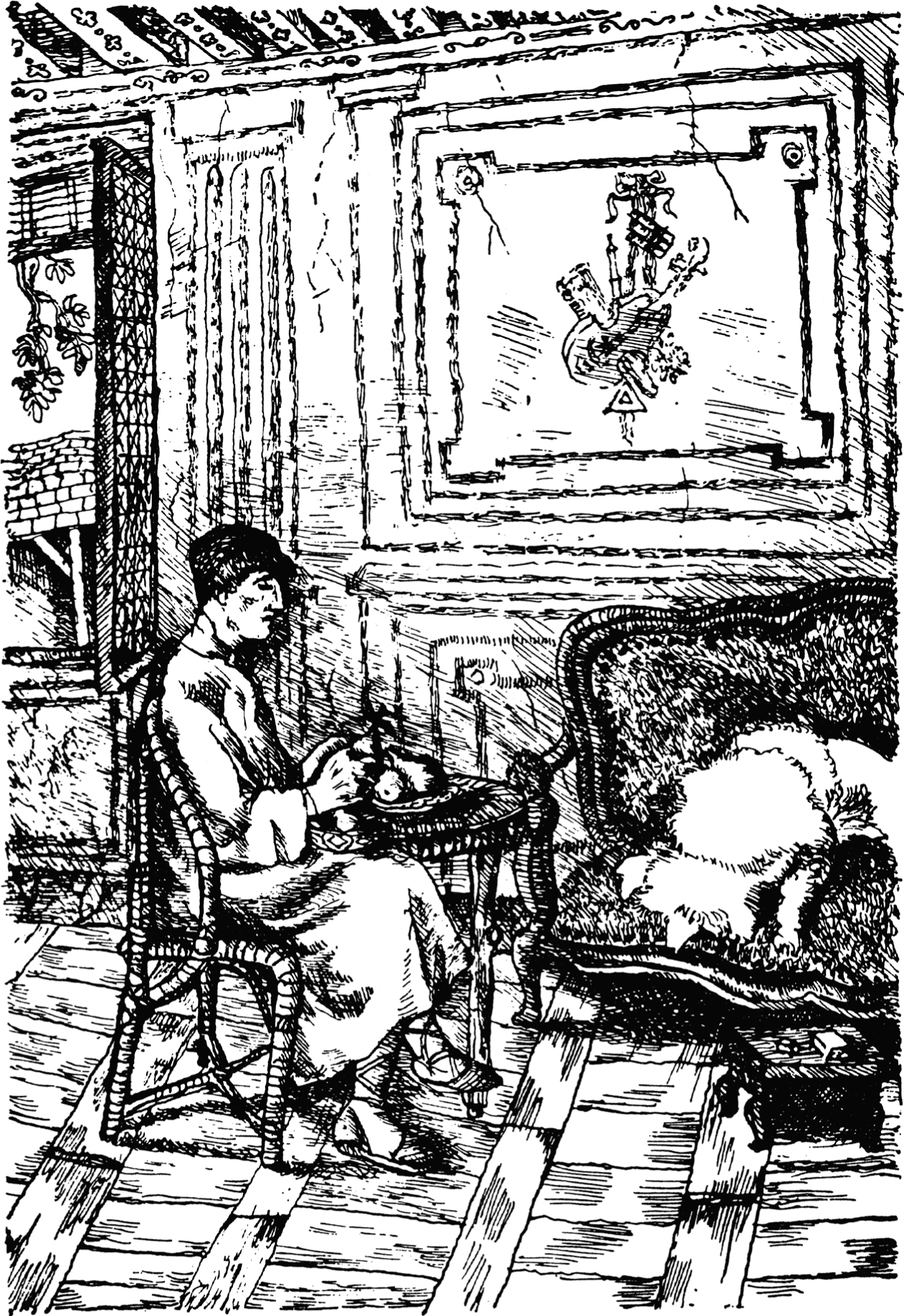Contents
OH, SAID ALICE, I COULDNT DO THAT.
Why not? asked the young publisher from New York who had been trying to persuade her to write a book about her life with Gertrude Stein and about the many people and adventures they had shared.
Because, said Alice in that cigarette-rough and sensuous voice, Gertrude did my autobiography and its done.
Since I could think of no response to that, I must have looked very sad; and since Alice had grown a bit fond of us in the years since Gertrudes death, she thought of something:
What I could do, she said as tentatively as she was able, which was not very, is a cook book. And then, It would, of course, be full of memories. She kept her promise.
In the extraordinary book she then wrote, she says of the French, that, like their Bourbon kings: They learn nothing, they forget nothing. Of Alice it can be said that she learned a great deal and forgot nothing. Into this modest (in size) volume, she put a generous sampling of what she had learned about food and cooking (French and American as she reinvented it), about the numerous and immensely varied and often very gifted friends and acquaintances whom she and Gertrude attracted, about life in Paris and in the country, about War and Occupation, about the U.S.A. in the 1950s, about servants (French, Swiss, Finnish and Asiatic), and, of course, about the celebrated woman who was the love and center of Alices life.
During the writing of the book there were several memorable moments for the lucky publisher, whose sole qualification for having anything to do with a book about food and cooking was a prodigious appetite for food (and wine) and a fascination for anything Alice did or said. One such moment came when Alice decided to test several of her recipes on the publisher and her old friend Thornton Wilder. For some reason, probably money, which she then had very little of despite the immensely valuable things on the walls, Alice decided to do without a maid, which meant the tiny and aging figure spent most of the lunch running back and forth between kitchen and dining room. Wilder, one of the worlds politest men, stood up every time Alice did. When she had put a huge platter of fried chicken on the table and Thornton was still at half-mast, she tried to help him to some chicken, saying curtly: Thornie, for Gods sake, sit down and Ill give you some chicken. Which do you prefer; light or dark?
The great man turned to his sister Isabel and asked: Which is it I prefer? Oh, God, said Alice, help yourself, dear Thornie. And back to the kitchen.
When the book appeared in 1954 it caused a small sensation, partly because of the fuss about hashish fudge, but mostly because of what it was: a unique book by a unique person. Which, of course, is why its stayed in print for thirty years and why theres this new edition, about which I presume to repeat what Alice once wrote when inviting us to lunch two days after we had lunched: The tiny words said: If this seems too soon to you, remember what the young man said: If perfection is good, more perfection is better.
| Simon Michael Bessie |
| 19541984 | 17.vii.84 |
WHAT AN EXTRAORDINARY PERSON! MISS TOKLAS HAS BEEN AN INTEGRAL part of my life (sensate, thinking, sensuous, spiritual) since I was in adolescence. And when I was newly twenty-one and newly married, I could have met her.
My husband and I stopped in Paris in 1929 on our way to some three years in Dijon at the university, and we had an introduction to Miss Stein and Miss Toklas, but I could not bring myself to present it. I could not walk around the corner with the letter in my hand.
Many years and lives later... and the fact remains that never did I meet this strange person, except through what other people wrote and said about her.
A while ago I re-read The Autobiography of Alice B. Toklas, which the Columbia Encyclopedia says Gertrude Stein published in 1933 as if by her secretary-companion. It is amazing, a literary tour-de-force, an almost great writer going with almost surgical sureness into the self of a loved one. It is amazing, because it feels and smells and is true; it is prescient. It is especially amazing for its detachment, its lack of vanity; it is not even condescending, the way a person is not condescending to his inner self. It is, for the lover who was Gertrude and who can be me or any chosen soul, the person who was/is Alice B. Toklas, and no other.
People who knew Alice or even met her casuallyshe often writes of friends (whom we had never met) of friends of oursalways knew her at once and forever, the way I did when I read her autobiography, the way Gertrude did when, a few minutes after she saw Alice, she said flatly that they were married for life. People have told me that when this small ugly woman was in a room they were keenly aware of her, before they even recognized her as Miss Toklas. She seemed to send out waves of inaudible sound, like bells clanging somewhere in another space than ours. And since I first read her so-called life, I am like everyone else, and know almost more about her and with her than I am really entitled to.
This was as true when I last lived in Paris as it had been the first time, in 1929, when I often walked past her door and knew she was behind it. By 1967 I had lived long enough to shed some of my first timidity, but she was hospitalized, too remote ever to welcome me as she might once have done.
I should perhaps try to explain how it happened that I missed my one last chance to meet her. In about 1938, my second husband and I were living in a vineyard south of Geneva, and we knew that now and then we must escape from our cautiously Calvinistic life as foreign land-owners. We decided that we could afford, for a year or so, to rent two small rooms in the servants quarters of the old Htel Continental in Paris, high in the attics above the Tuileries. We could leave books there, and perhaps some pictures, and city clothes. In the cold winters we could go up to La Capitale, escape the colder, duller, more structured life in Chexbres, feel warm and free before it was time to start spring planting and vineyard work....
Death and war changed all that.
But when I was offered a summer job in France by Time-Life, more than twenty years later, I took it. I felt I must go back, and this was my chance to. I was scared about being in Paris alone, for the first time in my life. Id been there countless times before, with parents, lovers, husbands, children. This time I was by myself, my self.
I asked to be lodged in the attic rooms my husband and I had planned to live in. By then they had become stylishly expensive, but thanks to the potent clout of my temporary employers I went straight from St. Helena, California, to the small, low-ceilinged cubbyhole wed meant to use for our books, our workroom. Sounds arose filtered and thin through the one big window, and the thick green of the Tuileries in summer. And in the next room, where we had meant to sleep, lived a trespasser, a stranger who became my good true friend, an elderly writer named Janet Flanner.
I had for a long time admired her masterly letters from Paris in The New Yorker, and at first felt some of the shyness that had kept me so long from presenting my letter of introduction to the two ladies around the corner on the rue de Fleurus. And there Janet was, in our private special room! And indeed she was there, with her plain typing table, one beautiful cabinet of inlaid boiserie, always with a big fading garden bunch of roses or field flowers brought each weekend from her lovers country house, her little bathroom always hung with a drying elegant nightgown or some tiny high-style panties. There were perhaps a hundred books and no pictures, and her narrow bed made the little room seem almost austere, except for the hum of all Paris as it rose from far below, and the magnificent light that poured in and up from the Tuileries and the Seine and the Left Bank. (Not long after that summer, Janet had to move to another old hotel because the Continental was bought by a world airline, but she was never as truly at home as in the attic bedroom where once I had thought I would live forever.)

